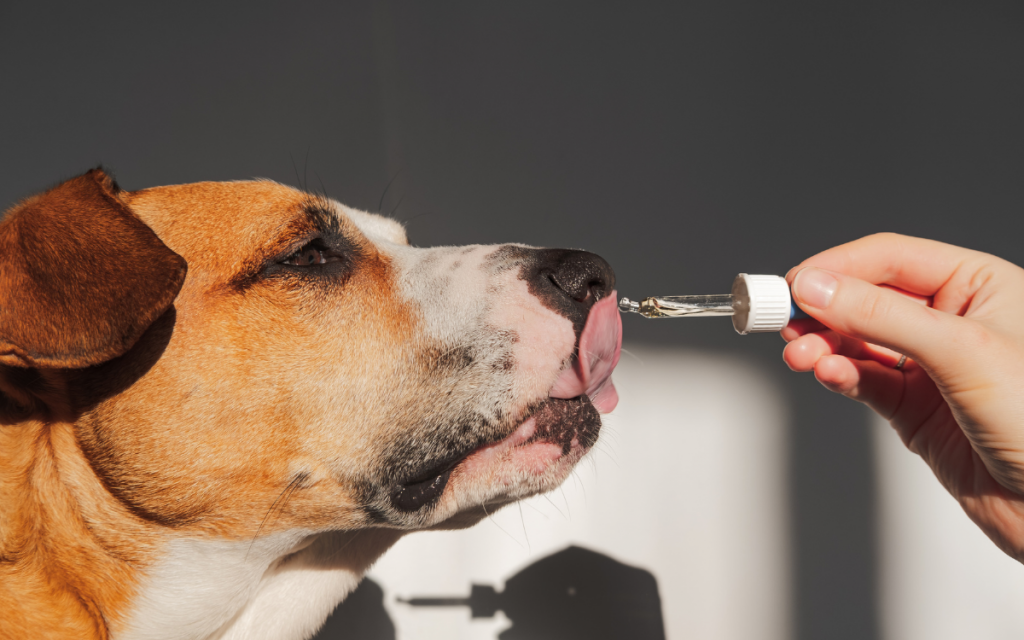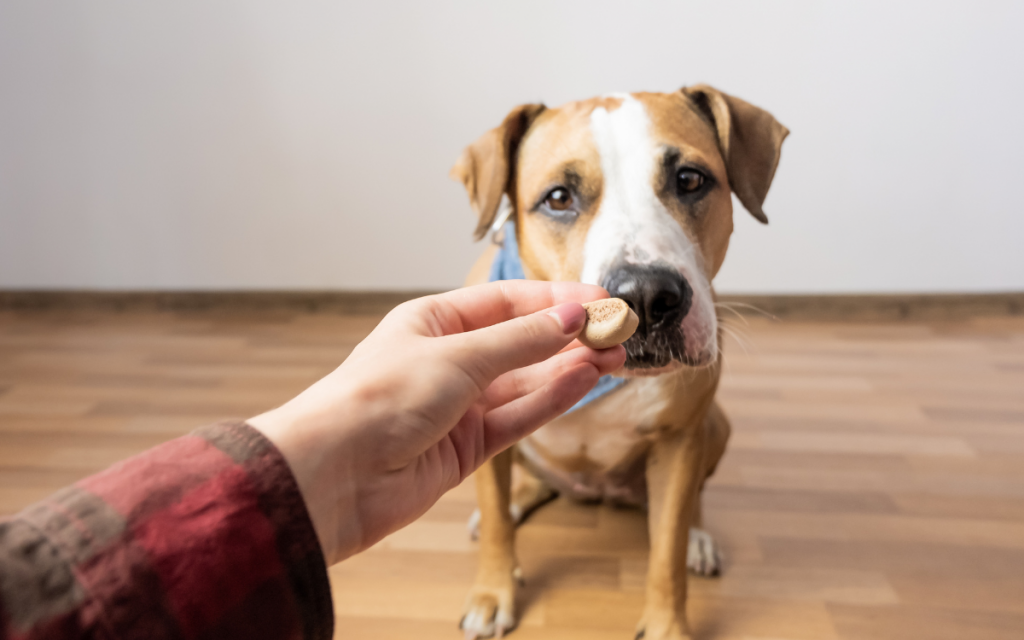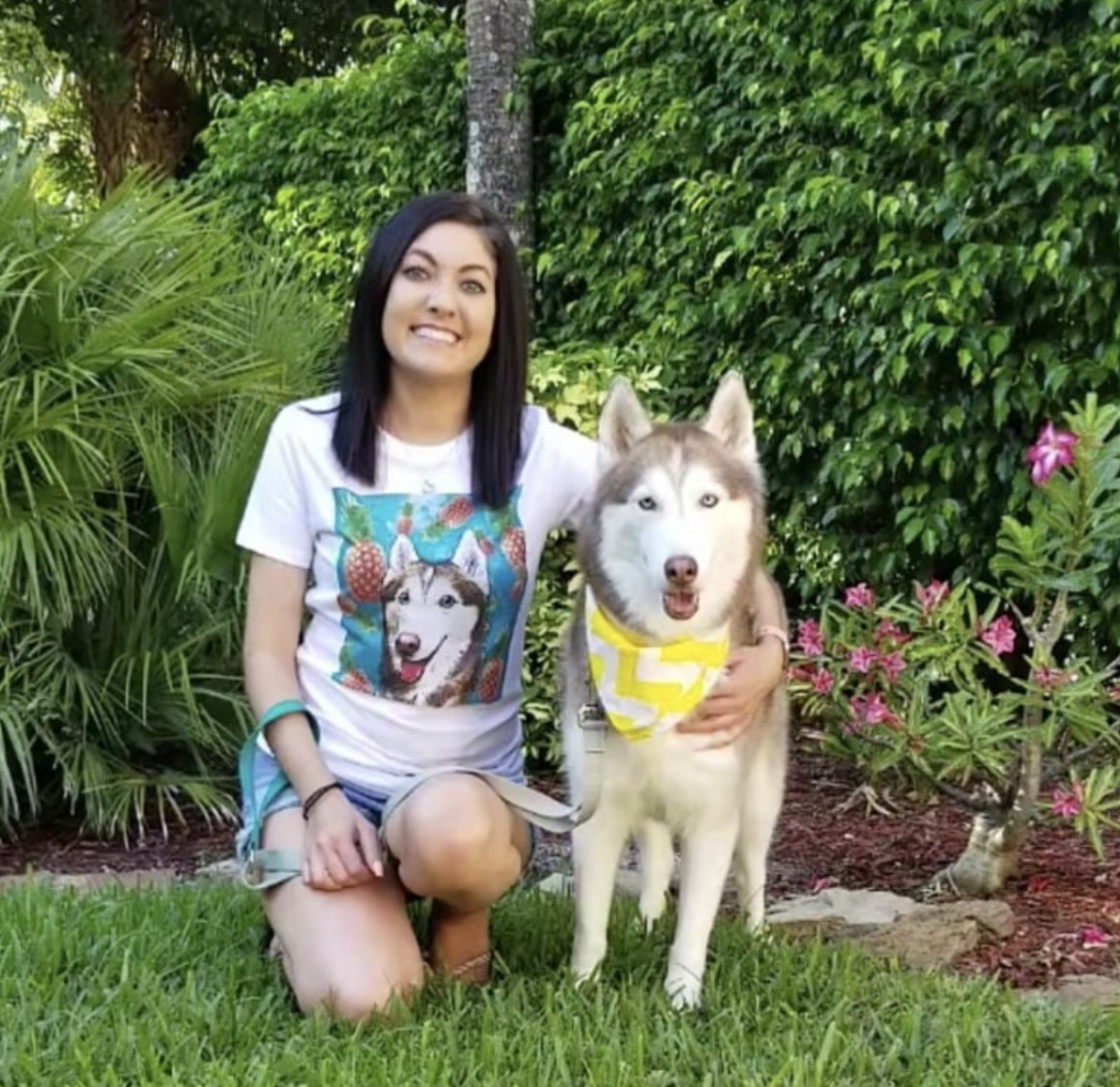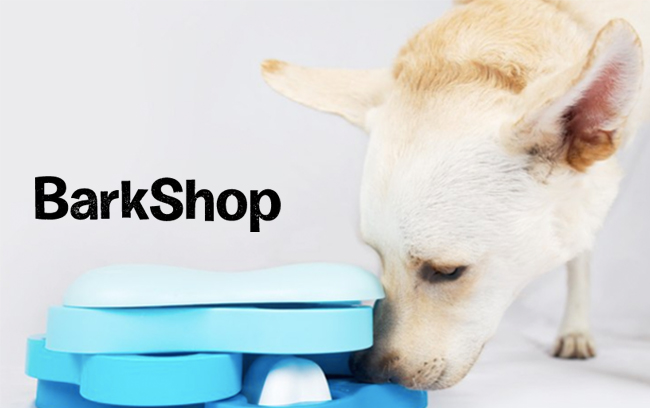For Pups With Short Attention Spans…
Salmon oil can be a very beneficial addition to your dog’s diet. Salmon oil is rich in Omega-3 and Omega-6 fatty acids that can contribute to joint health, heart health, and improve the skin and coat of your dog making them potentially softer, glossier, and less itchy. Given all these benefits, why doesn’t everyone supplement their dogs? Well, as with any supplement there is no exact science and every dog is different, so always consult your vet before adding any new fish oil supplements into your pup’s lifestyle.
For centuries, humans have known that fish oils (such as salmon oil) have some great health benefits. But it wasn’t until more recently that we’ve realized our pets can benefit from the healthy fatty acids found in fish oil just as much as we can. You won’t find anything fishy about these supplements—well, except, ya know… the fish!
What Is Salmon Oil And Fish Oil?


| What do you call a salmon who wears a tuxedo?….So-fish-ticated! |
Fish oil, in general, is a supplement used to help add healthy fats into your dog’s diet. You can find these supplements at most pet stores, and they often come in chewable, tablet, or liquid forms (FYI: the chews tend to be less stinky!). Different types of fish oil—like salmon, Alaskan pollock, cod etc..—have different amounts of Omega-3 and Omega-6 healthy fats. Each of these fats has different health benefits for your pup. This is why your vet may suggest a specific type of fish oil supplement over another. Most fish oils help support, among other things, heart health, joint health, kidney health , and a fabulously plush coat that’ll get both you and your dog tons of compliments! Salmon oil, in particular, has a very high amount of the healthy fat called Docosahexaenoic Acid (DHA), which helps support brain and eye health (more about this below).
Always consult your vet first before you give your dog any new supplement—like salmon oil! Depending on your dog’s health, fish oil may not be the right choice for them. Your vet can also help direct you toward a trusted brand with high quality ingredients.
What Are Omega-3 and Omega-6 Fatty Acids? And How Do They Help My Dog?


| Why shouldn’t you trust a tiny salmon?….Because it’s a little fishy. |
Omega-3 and Omega-6 fatty acids, found in salmon oil, are what we consider “good fats”. These are unlike the “bad” saturated fats and trans fats you’ll find in things like butter, fried food, and fast food. Your dog needs both Omega-3 and Omega-6 fatty acids in their diet, because their bodies don’t make these essential nutrients on their own 1 . These healthy fats provide awesome health benefits, but it’s important to have a proper balance between these two good fats in your dog’s overall diet. This is because Omega-6 helps boost your dog’s immune system, but too much of this type of fat can cause some inflammation when it’s not balanced out with Omega-3, which boasts anti-inflammatory properties. Think of it like a teeter-totter. You need both for a good balance!
More research is still needed to figure out the exact ideal ratio of Omega-3 to Omega-6 for dogs. This is tough for scientists to pinpoint since there’s such a wide variety of dog diets, but we do know a range to shoot for2. To figure out the proper dosing for your dog, it’s best to have your vet take a look at their overall diet—including food and supplements. It’s important to understand that, oftentimes, regular dog food can have an abundance of Omega-6 fatty acids, but skimps a bit on the Omega-3. This is why adding supplements rich in Omega-3—like salmon oil—can often be beneficial for dogs.
Omega-3 Fatty Acids
Omega-3 healthy fats usually come from sources like cold-water fish, canola oil, and seeds like flaxseed1. If a dog’s diet is deficient in Omega-3, it can lead to neurologic abnormalities and vision problems1. When shopping for salmon oil, the labels will tell you exactly which and how much of these Omega-3s are in the supplement:
- Alpha Linolenic Acid (ALA) – Found in corn oil, soybean oil, canola oil, and flaxseed oil1. Has anti-inflammatory properties. Supports heart health and skin health.
- Eicosatetraenoic Acid (EPA) – Found in cold water fish and phytoplankton1. Has anti-inflammatory properties. Helps maintain mental health.
- Docosahexaenoic Acid (DHA) – Found in cold water fish, phytoplankton and other marine plants1. Has anti-inflammatory properties. Also essential for brain and eye health.
Omega-6 Fatty Acids
Omega-6 fatty acids help protect the outer water barrier of your pup’s skin. This helps keep your dog’s skin and coat healthy. Omega-6 fats are also in charge of helping support your dog’s immune system, by preparing a team of white blood cells to fight off infections when needed. This is a good thing! However, having too much Omega-6 in your dog’s diet and not enough Omega-3 can sometimes cause mischief by creating inflammatory responses—like red and itchy skin.
- Linoleic acid – Found in corn oil, soybean oil, canola oil, and flaxseed oil. Contributes to healthy skin and coat, and helps treat dermatologic issues1.
- Arachidonic acid – Found in lean meats, egg yolks, and fish oils1.
What Are The Benefits Of Salmon Oil?


| Who does a salmon call when they get locked out of their house?….A lox-smith! |
Salmon oil and other fish oils offer tons of great health benefits for your four-legged friend. With all the ways salmon oil can help improve your pup’s health, we realize it can be tempting to purchase supplements right away. But always check with your vet first before starting supplements! Only your vet can advise you if salmon oil is the right choice for your dog and help with proper dosing—especially if your dog is under 6 months old, has health conditions, is taking medications, or is pregnant/breastfeeding.
Salmon Oil Benefits For Dogs:
- Anti-inflammatory effects1
- Boost energy1
- Helps with itching2
- Reduces dandruff2
- Improves arthritis pain3
- Improves airborne allergies2
- Benefits heart health2
- Benefits renal (kidney) health2
- Improves lymphoma symptoms2
- Softens hair and coat1
- Makes shinier, glossier hair2
- Helps control oily skin and coat2
Joint Benefits
There tend to be a lot of joint issues in the dog world. Some breeds are genetically prone to hip and joint issues, and other pups develop problems as they get older. The Omega-3 fats in salmon oil—especially DHA and EPA (explained above)—can help reduce inflammation, and may help many pups move around more comfortably3. However, fish oil is not a “cure-all” for joint pain! It can help in some mild to moderate cases, but severe joint issues will require additional treatment (e.g. pain meds, injection treatments, water therapy, laser treatment, etc.) under the care of a vet.
Heart Benefits
The anti-inflammatory effects from Omega-3 in salmon oil can also benefit heart health. It can help reduce inflammation associated with heart failure, reduce muscle loss in the heart, and help reduce abnormal heart rhythms3. But fish oil alone cannot reverse or prevent all heart conditions! It’s extremely important to talk to your vet about an overall care plan for your dog’s heart health.
Kidney Benefits
Some studies have shown that adding Omega-3 to a dogs diet can help improve kidney function by reducing the amount of protein in their urine3. However, more research is needed in this area. It’s not quite clear how and how well Omega-3 works to improve kidney function.
Skin & Coat Benefits
There is abundant evidence to suggest that giving your dog a daily fish oil supplement, like salmon oil, can help improve the quality of their skin and coat2. This means a softer coat and glossier, shinier hair! It can also help with certain skin conditions, but it’s important to remember that fish oil alone can’t fix underlying health issues that cause come skin conditions.
How To Choose A Fish Oil Supplement?


Be careful when choosing salmon oil supplements and other supplements for your dog. It’s important to choose a brand with high standards for quality. It’s best to ask your vet for brands they recommend and that they know to be safe.
- Look for the exact quantities of Omega-3 and Omega-6 listed in the ingredients
- Check for companies who use third-party-testing of their product
- Avoid fish oil manufactured in countries known for lower-quality manufacturing standards for pets
- Avoid salmon oil with unnecessary added ingredients
- Consider fish oil companies who use wild-caught fish (they contain fewer contaminants)
- Consider companies who use sustainable fishing practices
- Check expiration dates: expired products are prone to rancidity which can actually ruin the health benefits of Omega fatty acids and even cause new problems
- Make sure to read the proper storage instructions for the product you get: different formats of Omegas require different storage practices to keep those products usable and safe.
Quality
How do you ensure you’re giving your dog the best salmon oil? It’s incredibly important to consider quality when it comes to any type of supplement—including salmon oil. Quality fish oils will list the exact amounts and types of Omega-3 and Omega-6 fats on their product label4. It’s also best to choose a company who uses third-party-testing to evaluate the purity, freshness, and safety of their product4. This means that the fish oil company hires people who do not work for them to test the quality of their product. This helps you, as a buyer, know that the company making the salmon oil isn’t just lying and saying “We toootally use quality ingredients, guys, trust us! (*wink, wink, nudge nudge*)”
Additionally, it’s important to consider where your dog’s salmon oil is being made, where the fish are being harvested, and what additional ingredients are being added to the supplement. Some supplements add unnecessary ingredients that can even be harmful to your pup4. Others may be produced in countries with lower quality manufacturing standards. And lastly, some companies use farmed salmon, while other use fresh-caught. Sources suggest that higher traces of contaminants are found in farmed salmon.
Environmental Considerations
You may want to consider choosing wild-caught salmon over farmed salmon. Not only have farmed fish been documented as containing higher levels of contaminants, but these fisheries also keep the fish in cramped, confined (and poop-filled) waters.
Additionally, when it comes to salmon oil and other fish oils, you may want to consider companies that prioritize sustainable fishing. When fisheries over-fish, the fish population can’t reproduce fast enough to keep making more fish. This means, eventually, that fish population will be demolished, which is harmful to the environment. That’s why it’s important to consider a salmon oil that uses sustainable fishing practices (a.k.a. they harvest only the fish they need, while leaving enough to reproduce).
Fish oil supplements that follow sustainable fishing practices or using wild-caught fish will list this on the label or their website.
Product Form
This just depends on you and your dog’s preferences. Salmon supplements usually come in the form of liquid drops, chews, or tablets. Your dog might prefer one over another, but you probably prefer whichever version doesn’t leave everything smelling like fish! Although liquid salmon oil is usually the most fishy-smelling, it’s also the option that’s most pure. Chews and tablets often use additional ingredients to help keep their shape and keep them fresh. So, if you decide to go with the stinky liquid, maybe just follow up the supplement with a dental chew to freshen their breath!
How to Use Salmon Oil for Dogs
Once you’ve done your homework and consulted with your vet on the best salmon oil supplement for your pup, you’re ready to start incorporating this healthy supplement into your dog’s diet. If you choose to use fish oil in the liquid form, try drizzling the recommended amount on your dog’s food once a day. This is a great option for pups that don’t like chews or tablets.
Salmon oil dosage is typically based on a dog’s weight, so be sure to reference the label to ensure you’re using the recommended amount. To avoid potential digestive issues, try introducing fish oil to your dog slowly, giving your pup a little at first then gradually increasing the recommended amount.
This article has been reviewed by Margo Hennet, DVM.
Margo Hennet, DVM, cVMA, and veterinarian at BARK is a canine nutrition, health, & wellness connoisseur. She has a combined 10 years of experience in clinical medicine, research, and education—that’s 70 dog years of know-how—and graduated from Colorado State University as a Doctor of Veterinary Medicine. She completed specialized training in internal medicine prior to working as a general practitioner in Colorado, has authored peer-reviewed publications and textbook chapters, holds certification in veterinary medical acupuncture, and is a member of the American Academy of Veterinary Nutrition and American Veterinary Medical Association.
Sources:
1Branam, Ed. “Role of Dietary Fatty Acids in Dogs & Cats.” Today’s Veterinary Practice, 2016, https://todaysveterinarypractice.com/nutrition/role-of-dietary-fatty-acids-in-dogs-cats/.
2Brooks, Wendy. “Omega Three Fatty Acids for Our Pets.” Veterinary Partner, VIN, 10 June 2019, https://veterinarypartner.vin.com/default.aspx?pid=19239&id=9155186.
3Spadanuta, Clarissa, and Deborah E Lindner. “Should I Give Fish Oil to My Pet?” Tufts University: Clinical Nutrition Service at Cummings School, Petfoodology, 25 Oct. 2018, https://vetnutrition.tufts.edu/2018/06/should-i-give-fish-oil-to-my-pet/.
4“Canine Fish Oil Dosing Chart.” Colorado State University: Veterinary Teaching Hospital, Veterinary Teaching Hospital: Orthopedic Medicine and Mobility, 24 May 2022, https://vetmedbiosci.colostate.edu/vth/services/orthopedic-medicine/fish-oil-dosing/.








